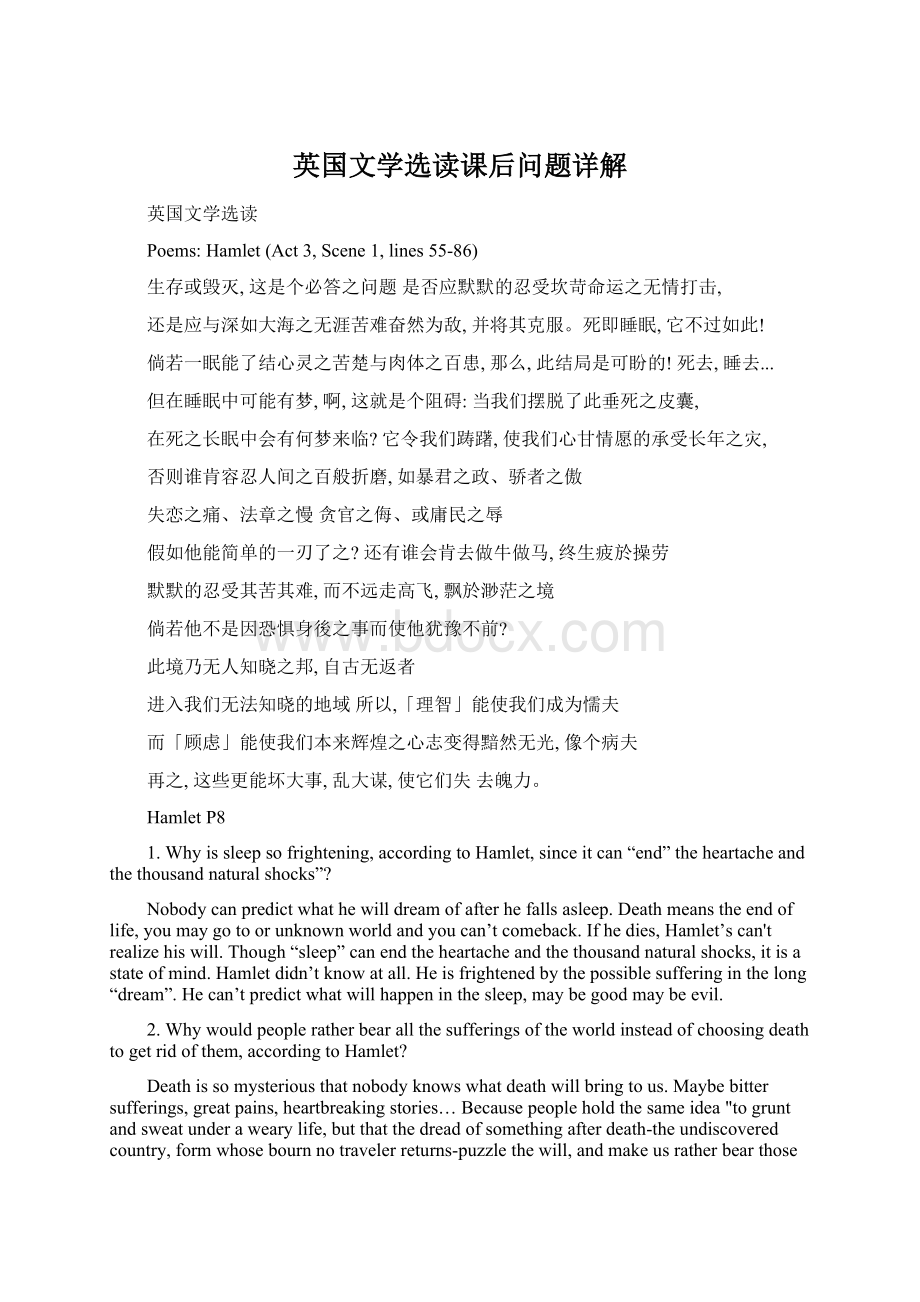英国文学选读课后问题详解.docx
《英国文学选读课后问题详解.docx》由会员分享,可在线阅读,更多相关《英国文学选读课后问题详解.docx(10页珍藏版)》请在冰豆网上搜索。

英国文学选读课后问题详解
英国文学选读
Poems:
Hamlet(Act3,Scene1,lines55-86)
生存或毁灭,这是个必答之问题是否应默默的忍受坎苛命运之无情打击,
还是应与深如大海之无涯苦难奋然为敌,并将其克服。
死即睡眠,它不过如此!
倘若一眠能了结心灵之苦楚与肉体之百患,那么,此结局是可盼的!
死去,睡去...
但在睡眠中可能有梦,啊,这就是个阻碍:
当我们摆脱了此垂死之皮囊,
在死之长眠中会有何梦来临?
它令我们踌躇,使我们心甘情愿的承受长年之灾,
否则谁肯容忍人间之百般折磨,如暴君之政、骄者之傲
失恋之痛、法章之慢贪官之侮、或庸民之辱
假如他能简单的一刃了之?
还有谁会肯去做牛做马,终生疲於操劳
默默的忍受其苦其难,而不远走高飞,飘於渺茫之境
倘若他不是因恐惧身後之事而使他犹豫不前?
此境乃无人知晓之邦,自古无返者
进入我们无法知晓的地域所以,「理智」能使我们成为懦夫
而「顾虑」能使我们本来辉煌之心志变得黯然无光,像个病夫
再之,这些更能坏大事,乱大谋,使它们失去魄力。
HamletP8
1.Whyissleepsofrightening,accordingtoHamlet,sinceitcan“end”theheartacheandthethousandnaturalshocks”?
Nobodycanpredictwhathewilldreamofafterhefallsasleep.Deathmeanstheendoflife,youmaygotoorunknownworldandyoucan’tcomeback.Ifhedies,Hamlet’scan'trealizehiswill.Though“sleep”canendtheheartacheandthethousandnaturalshocks,itisastateofmind.Hamletdidn’tknowatall.Heisfrightenedbythepossiblesufferinginthelong“dream”.Hecan’tpredictwhatwillhappeninthesleep,maybegoodmaybeevil.
2.Whywouldpeopleratherbearallthesufferingsoftheworldinsteadofchoosingdeathtogetridofthem,accordingtoHamlet?
Deathissomysteriousthatnobodyknowswhatdeathwillbringtous.Maybebittersufferings,greatpains,heartbreakingstories…Becausepeopleholdthesameidea"togruntandsweatunderawearylife,butthatthedreadofsomethingafterdeath-theundiscoveredcountry,formwhosebournnotravelerreturns-puzzlethewill,andmakeusratherbearthoseillswehavethanflytoothersthatweknownotof?
”Peoplealsoarefrightenedbythemythsinanotherworldafterdeath.
3.What,afterall,makespeoplelosetheirdeterminationtotakeaction?
Pleaseexplaininrelationtotheso-calledhesitationofHamlet.
Conscienceandover-considerations.Hewantstorevenge,butdoesn’tknowhow.Hewantstokillhisuncle,butfindsittoorisky.Helivesindespairandwantstocommitsuicide.However,heknowsifhedies,nobodywillcomforthisfather’sghost.Heisinfaceofgreatdilemma.Theydon’tknowtheresultaftertheirtakingtheaction.SuchasHamlet,hedoesn’tknowwhatwouldhappenifhekillshisuncleorkillshimself.SoHamletwashesitated.
Sonnet18P15
我怎么能够把你来比作夏天?
你不独比它可爱也比它温婉:
狂风把五月宠爱的嫩蕊作践,夏天出赁的期限又未免太短:
天上的眼睛有时照得太酷烈,它那炳耀的金颜又常遭掩蔽:
被机缘或无常的天道所摧折,没有芳艳不终于雕残或销毁。
但是你的长夏永远不会雕落,也不会损失你这皎洁的红芳,
或死神夸口你在他影里漂泊,当你在不朽的诗里与时同长。
只要一天有人类,或人有眼睛,这诗将长存,并且赐给你生命。
1.Howdoesthepoetanswerthequestionheputsforthinthefirstline?
Thepoetopenswithaquestionthatisaddressedtothebeloved,"ShallIcomparetheetoasummer'sday?
"Thisquestioniscomparing“thee”tothesummertimeoftheyear.Itisduringthistimewhentheflowersareblooming,treesarefullofleaves,theweatheriswarm,anditisgenerallyconsideredasanenjoyabletimeduringtheyear.Thefollowingelevenlinesinthepoemarealsodedicatedtosimilarcomparisonsbetweenthebelovedandsummerdays.
2.Whatmakesthepoetthinkthat“thou”canbemorebeautifulthansummerandimmortal?
Attheverybeginning,thepoetputsforthaquestion:
“ShallIcomparetheetoasummer’sday?
”Thenhegivesananswer:
“Thouartlovelierandmoretemperate.”Ontheonehand,“RoughwindsdoshakethedarlingbudsofMay,andsummer’sleasehathalltooshortadate;”ontheotherhand,“Sometimetoohottheheavenshines,andoftenishisgoldcomplexiondimmed.”Sofromtheabovetwoaspectsthepoetthinksthat“thou”canbemorebeautifulthansummer.Inaddition,“Andeveryfairfromfairsometimedeclines,bychance,ornature’schangingcourseuntrimmed.”Comparedwithimmortal,“Butthyeternalsummershallnotfade,norlosepossessionofthatfairthouow’st,norshalldeathbragthouwand’restinhisshade,whenineternallinestotimesthougrow’st.”Therefore,thepoetdrawsaconclusion:
“Solongasmencanbreatheoreyescansee,solonglivesthis,andthisgiveslifetothee.”Inthispoem,thepoetmakes“thou”morebeautifulthansummerandimmortalbecauseofhisbeautifullines.Sointhiscase,“thou”inthepoemcanberegardedasfemalebecauselovecanbeautyeternal.Or“thou”canbereferredtomale,forfriendshipcanmakebeautyeverlasting.Even“thou”canbeabstract“love”or“beauty”whichwillbecomeeternalinthewonderfulpoem.
莎士比亚诗歌的两个主题:
时光不饶人,青春和美丽是短暂的;只有诗歌才有力量使美丽与爱情永存。
(theme:
只有文学可与时间抗衡)
Change,Fate,andEternity
Howevermuchitmightlookhe’spraisingabeloved,thispoetisdefinitelymoreconcernedwithtootinghisownhorn.Really,youcouldsumupthepoemlikethis:
"DearBeloved:
You’rebetterthanasummer’sday.ButonlybecauseIcanmakeyoueternalbywritingaboutyou.Love,Shakespeare."Thatmessageiswhyimagesandsymbolsoftime,decay,andeternityarealloverthispoem.Whetherornotwethinkthebelovedisactuallymadeimmortal(orjustmoreimmortalthanthesummer’sday)isupintheair,butit’scertainlywhatthespeakerwantsyoutothink.
Line4:
Thisiswherethespeakerstartspointingtohowshortsummerfeels.Usingpersonificationandmetaphor,thespeakersuggeststhatsummerhastakenoutaleaseontheweather,whichmustbereturnedattheendofthesummer.Summeristreatedlikeahome-renter,whiletheweatheristreatedlikeareal-estateproperty.
Lines7-8:
Theselinesgiveustheproblem(everything’sgoingtofadeaway)thatthepoetisgoingtoworkagainst.
Lines9-12:
Theselinesarefullofallsortsoffigurativelanguage,allpointingtohowthespeakerisgoingtosavethebelovedfromthefateoffadingaway.Thebeloved’slifeisdescribedinametaphorasa"summer,"andthenhisorherbeautyisdescribedinanothermetaphorasacommoditythancanbeownedorowed.Deathisthenpersonified,astheoverseeroftheshade(ametaphoritselfforanafterlife).Finallythe"linestotime"areametaphorforpoetry,whichwillultimatelysavethebeloved,and"eternal"isaparallelwith"eternalsummer"inline9.
Lines13-14:
What’ssointerestingabouttheselinesisthatit’shardtotellwhetherthespeakerisusingfigurativelanguageornot.Doesheactuallymeanthatthepoemisalive,andthatitwillkeepthebelovedalive?
Well,itdependswhatwemeanby"alive."Ifwereadalivescientifically,asinbreathingandthinking,wellthenaliveisdefinitelyametaphor.Butifwereaditasdescribingacontinuedexistenceofsomekind,wellthenmaybehedoesmeanitliterally,sincesurelythepoemandthebelovedexistforusinsomesense.
Sonnet18dealswiththeconventionalthemethatnaturalbeautywillsurelybeknockedoutwiththepassingoftimeandthatonlyart(poetry)canbringeternitytotheonethepoetlovesandeulogizes.
IWanderedLonelyasaCloudP61
我好似一朵孤独的流云,高高地飘游在山谷之上,
突然我看见一大片鲜花,是金色的水仙遍地开放,
它们开在湖畔,开在树下,它们随风嬉舞,随风波荡。
它们密集如银河的星星,像群星在闪烁一片晶莹,
它们沿着海湾向前伸展,通往远方仿佛无穷无尽;
一眼看去就有千朵万朵,万花摇首舞得多么高兴。
粼粼湖波也在近旁欢跳,却不如这水仙舞得轻俏;
诗人遇见这快乐的旅伴,又怎能不感到欣喜雀跃;
我久久凝视--却未领悟这景象所给我的精神至宝。
后来多少次我郁郁独卧,感到百无聊赖心灵空漠;
这景象便在脑海中闪现,多少次安慰过我的寂寞;
我的心又随水仙跳起舞来,我的心又重新充满了欢乐。
1.Whatistherelationbetweenthepoetandnatureasdescribedinthepoem?
ThemeofManandtheNaturalWorld:
Wordsworthisthegranddaddyofallnaturepoets,andhe’sintopformin"IwanderedlonelyasaCloud."Inherjournalentryaboutthedayinquestion,Wordsworth'ssisterDorothywroteabouttheirsurpriseatfindingsomanydaffodilsinsuchastrangeplace,nexttoalakeandundersometrees."How’dthosegetthere?
"shewondered,evenguessingthatmaybetheseedsfloatedacrossthelake.Theeventisoneoftheminormiraclesthatnatureproducesallthetime,asanyonewhohasseenthedocumentaryPlanetEarthortheDisneymovieEarthknows.Wordsworth’snatureisfulloflifeandvitality.Heappreciatesitswildnessandunpredictability,buthehumanizesthelandscapeandfitsittohisownmind.
ThemeofHappiness"IwanderedlonelyasaCloud"isapoemthatjustmakesyoufeelgoodaboutlife.Itsaysthatevenwhenyouarebyyourselfandlonelyandmissingyourfriends,youcanuseyourimaginationtofinenewfriendsintheworldaroundyou.AsJohnMiltonfamouslywrote,"Themindisitsownplace,andinitself,canmakeheavenofHell,andahellofHeaven."Thespeakerofthispoemmakesaheavenoutofawindydayandabunchofdaffodils.Hishappinessdoesnotlastforever–he’snotthatunrealistic–butthedaffodilsgivehimalittleboostofjoywheneverheneedsit,likerecharginghisbatteries.
ThemeofSpiritualityThe19thcenturyScottishwriterThomasCarlylecoinedthephrase"naturalsupernaturalism,"whichhasbeenusedbylatercriticstodescribehowtheRomanticpoets,andespeciallyWordsworth,viewedthenaturalworldasaspiritualrealm.TheideaisthatHeavencomesdowntoearthandisviewedaspartoftheworld.Thispoemillustratestheprincipleofnaturalsupernaturalism.Thedaffodilsarelikeangelsandtwinklingstars,andthe"bliss"ofheavenoccursinspeaker’simagination.HeusesChristianideasandimagestomakeanodetonaturewithoutanyreferencetoGod.
ThemeofMemoryandthePast"IwanderedlonelyasaCloud"isalmostlikeasimplerversionof"TinternAbbey,"oneofWordsworth’sothermostfamousworks.Inbothpoems,thememoryofbeautifulthingsservesasacomforttothespeakerevenaftertheexperienceofviewingthemhasended.Hecanalwaysdrawonhisimaginationtoreproducethejoyoftheeventandtorememberthespiritualwisdomthatitprovided.Inthecaseof"IwanderedlonelyasaCloud,"wedonotrealizejusthowfarinthefuturethespeaker’sperspectiveislocateduntilthefourthstanza,whenhedescribesjusthowoftenthedaffodilshavecomfortedhim.
2.Doyouthinknaturecanhavehealingeffectonmind?
Ith